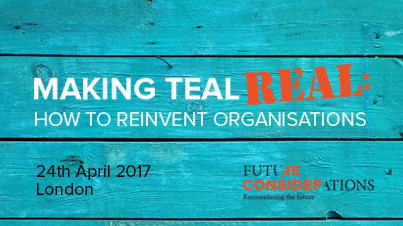Reflections on ‘Making Teal Real’ Workshop
In a full day of study, Jon and Jackie successfully managed the hopes and fears of experienced practitioners, complete newbies … and people, like the author of this review, Richard Longman, somewhere in between. This reflection explores Richard’s own connection with Laloux’s text, and what emerged from a day spent immersed in its ideas with like-minded, curious people at the ‘Making Teal Real’ workshop held on 24 April 2017.
I came across Reinventing Organizations (RO) about two years ago and it has already had a big influence on my life. As an academic, I spend a lot of time reading, writing, lecturing, and developing my own ideas … and a lot less time (alas) discussing these ideas with others. Attending ‘Making Teal Real’ was a superb way to try to address this imbalance.
My own work leans towards critical theory—a new way of thinking and writing which emerged in the early twentieth century—which connects with a core question posed by Laloux: “Could it be that our current worldview limits the way we think about organizations?” Spoiler alert … I think it does.
Why attend a Making Teal Real Workshop
One of the powerful benefits of spending a day with new people is that it can “refresh” your worldview. I don’t think we do nearly enough of it. Joining our workshop were experienced consultants and coaches, alongside others representing the traditional functions of management, and those with more creative flair, and some with spiritual passion. We showed up, in varying degrees of wholeness, to explore new voices, and to share our own.
“Extraordinary things begin to happen when we dare to bring all of who we are to work.” (Laloux)
My workshop experience
We opened with a powerful role-play simulation based on the merger of two companies. We played out the roles of different members of the respective boards, identifying behaviours and language associated with the different stages of development found in Spiral Dynamics Integral (SDi) and translated into RO. Later we introduced Teal-oriented facilitators into the exercise, to reconcile some of the emergent conflicts.
Whilst I have some concerns about the conceptual identification of these stages of development that I need to resolve for myself, there is no doubting their emotional power to describe organizational paradigms and potency to develop a richer worldview.
That said, this underlying conceptual work is not for the faint-hearted. For a group encountering SDi largely for the first time, I felt we could make only a good stab at engaging with its most important ideas. I developed my personal understanding of how the Teal destination transcends and includes previous stages of development, which is one of the ways in which it connects with the work of Ken Wilber and Don Beck.
Much of the energy was directed towards gaining a better understanding of ‘how’ self-management, wholeness, and evolutionary purpose would be realised in a Teal-centred organization. I think we workshop participants might have misjudged this ‘how,” and can be forgiven for presupposing a set of prescriptive measures which would make Teal real. We learned that the reality is quite different. In the words of a co-attendee, “The day brought us closer to understanding how making Teal real is as much about the process that gets us there as it is about the outcome”.
Our facilitators generously shared their own experiences of going Teal, showing it not to be an easy choice. Making choices compels us to encounter the unexpected and the unknown, and to become aware of our own ignorance. Tensions arise from this uncomfortable state … we don’t like to be taken by surprise. Yet here, the openness and candour of our facilitators was a most pleasant surprise.
On reflection, I attribute this in part to their innate human qualities, but also to the very essence of Teal which our facilitators strive to embody in their practice, sometimes successfully, other times (by their own admission) less so. It is easy for us who follow to assume that those who lead the way know the ultimate destination in its fullness.
As the day ended, we reflected on the claims that could be made on the basis of the twelve organizations described by Laloux. We agreed that it will be important to document the experience of the increasing numbers of organizations that are ‘going Teal’. Those of us who are excited by Teal, and attracted to its underlying worldview, must be prepared to test and expand knowledge, and to refine the way we think and talk about Teal.
In summary
Laloux claims that, “Consensus comes with another flaw. It dilutes responsibility.” As an academic, I am trained to look for gaps in knowledge and/or to problematise established knowledge, and this is the way I take responsibility: by probing consensus. I believe we all must probe those commonsense narratives that embed an unquestioned consensus in how we think and act, and be ready to re-evaluate knowledge in the light of changing life-conditions.
Teal raises many important questions. I believe we should take the responsibility to consider these questions, about our worldview and the impact this has on individuals and organizations.
These are questions that welcomed Reinventing Organizations into my life, and they will do for others. I think my students would enjoy the counterpoint it offers to their experiences of modern life, and I think my colleagues would enjoy the opportunity to problematise and theorise around a whole new set of ideas.
Richard Longman is a Doctoral Researcher and Associate Lecturer in the Faculty of Business at Oxford Brookes University, where his research explores the phenomenon of ‘surprise’ in organizations. This intersects with his fascination with ‘alternative’ forms of organization, and the co-transformative power that digital technologies have over how we experience life and work. He undertakes consulting, coaching, and mentoring in those broad spaces where individuals seek to be ‘better’ at what they do. Email richardlongman@brookes.ac.uk


Leave a Reply